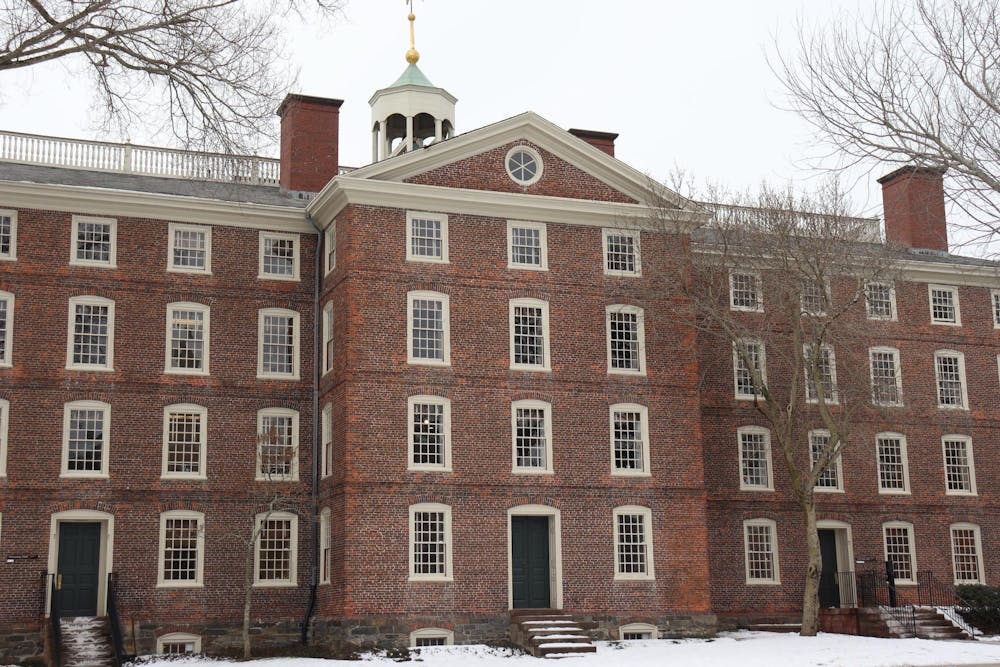As part of an ongoing review of a proposal calling on the University to cut financial and social ties with the fossil fuel industry, the Advisory Committee on University Resource Management met on Thursday to discuss the influence of corporate funding on academic freedom.
ACURM, an advisory body to the president, “considers how ethical and moral standards are applied across all of Brown’s business and investment practices in a manner consistent with the University’s mission and values,” according to its website.
The meeting took place just over a month after student leaders of Sunrise Brown presented a proposal to ACRUM that called on the University to dissociate from the fossil fuel industry, The Herald previously reported. The group’s proposal, first outlined in an April 2023 memo to the advisory committee, was based on findings from its February 2023 report titled “Dissociate Now: A Fossil Free Brown.”
According to the group’s report, since 2010, Brown-affiliated authors have published 63 journal articles “with funding from the world’s fifty largest oil and gas companies.”
“Researchers must be free to determine their own agendas and declare their findings without fear of reprisal or the withdrawal of funding,” the organization wrote in its April 2023 memo to ACRUM. The report continues that “freedom is compromised by relying on an industry whose business model does not permit science-led climate action.”
Associate Professor of German Studies Kristina Mendicino, who leads Brown’s chapter of the American Association of University Professors, spoke at the meeting about how the AAUP’s principles of academic freedom might be applied to Sunrise’s proposal.
“One basic principle that is still maintained … is that faculty should have the right to seek support for their research through funding opportunities, including corporate funding,” Mendicino told ACURM members at the meeting. She added that the issue “is not so simple,” and that “there is extensive research also demonstrating that donor funding can influence the academic enterprise in ways that limit academic freedom.”
She also described past instances in which corporate funding has unduly influenced the outcomes of faculty research at Brown, citing the case of David Kern, a former associate professor of medicine at Brown University’s Warren Alpert Medical School.
In 1997, Kern, an occupational health specialist who worked at The Memorial Hospital in Providence, discovered “flock worker’s lung” after investigating cases of unknown illnesses at a local textile factory. Hospital and University officials told Kern that he risked legal action from the textile manufacturing company if he published his findings due to a confidentiality agreement he signed when first visiting the factory.
After Kern presented his findings, The Memorial Hospital eliminated Kern’s unit and Brown declined to renew his teaching contract.
“Brown University and the Brown University School of Medicine recognize the importance and value of work undertaken by Dr. David Kern and fully support Dr. Kern in his right to conduct research and in his academic freedom to publish results,” University officials wrote in a 1997 statement.
“I hope that, before all else, my presentation conveyed the very real threat of corporate interests to the academic mission and integrity of our University,” Mendicino wrote in an email to The Herald, emphasizing the reality of the threat of undue influence of corporate funding and referring to “the case of our former colleague David Kern.”
After Mendicino’s presentation, committee members discussed potential methods to prevent corporate funding sources from influencing faculty research projects. One member suggested that the University could vet corporate funding sources prior to a faculty member accepting a grant, while refraining from blacklisting an entire industry.
Dissociation was one of three demands that Sunrise listed on a memo to the committee in April of 2023. The group’s original proposal also called for the adoption of a fossil-free career policy, and for the University to offer faculty a fossil-free retirement plan.
After discussions with Sunrise leaders, the Center for Career Exploration said it would no longer invite fossil fuel companies to host on-campus recruitment events but did not publicly alter its recruiting policies, The Herald previously reported. The University also added a “fossil-fuel free” mutual fund option to its retirement plan offerings in late December.
Members of the advisory committee also discussed Princeton’s commitment in Sept. 2022 to cut all financial and social ties with 90 fossil fuel companies based on criteria set by a panel of faculty experts at the university. Faculty are prohibited from receiving grant funding from these companies, which number 2,371 as of February 2024, according to Princeton’s fossil fuel dissociation website.
At the time of dissociation, Princeton also announced the creation of a new energy research fund for faculty “in part to offset research funding no longer available because of dissociation.”
At the meeting, ACURM Chair Kurt Teichert, a senior lecturer in environmental and society, noted that the two institutions took different approaches to divestment from the fossil fuel industry.
“Princeton had made a public announcement about divestment from fossil fuels … because they were the fossil fuel industry, and (Princeton) didn't want to be associated,” Teichert said.
Brown, on the other hand, portrayed the divestment decision as purely fiduciary, and the Corporation never passed an official divestment resolution. “It wasn't necessarily to make the statement that Brown is just divesting to delegitimize the industry,” Teichert said.
Mendicino emphasized that any decision about restricting sources of funding for faculty research should come from faculty members.
“The faculty member receiving the funding is definitely pursuing academic freedom and soliciting the funding. On the other hand, this funding comes with goals and strings attached,” Mendicino said at the meeting. “Having guardrails in place to protect academic freedom from such influence is extremely important.”
Ethan Schenker is a university news editor covering staff and student labor. He is from Bethesda, MD, and plans to study International and Public Affairs and Economics. In his free time, he enjoys playing piano and clicking on New York Times notifications.





